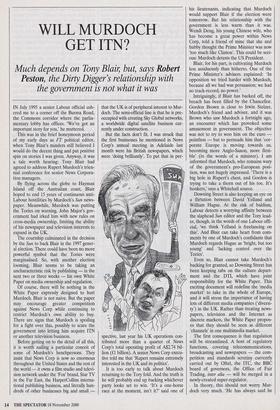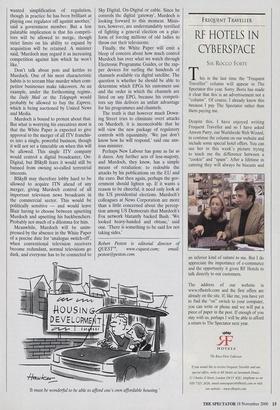WILL MURDOCH GET ITN?
Much depends on Tony Blair, but, says Robert Peston, the Dirty Digger's relationship with
the government is not what it was
IN July 1995 a senior Labour official ush- ered me to a corner off the Burma Road, the Commons corridor where the parlia- mentary lobby has offices. 'We've got an important story for you,' he muttered.
This was in the brief honeymoon period of my early days as FT political editor, when Tony Blair's minders still believed I would do the decent thing and put positive spin on stories I was given. Anyway, it was a tale worth hearing: Tony Blair had agreed to address Rupert Murdoch's trien- nial conference for senior News Corpora- tion managers.
By flying across the globe to Hayman Island off the Australian coast, Blair hoped to end 15 years of continuous anti- Labour hostilities by Murdoch's Sun news- paper. Meanwhile, Murdoch was putting the Tories on warning. John Major's gov- ernment had irked him with new rules on cross-media ownership, limiting the ability of his newspaper and television interests to expand in the UK.
The courtship culminated in the decision by the Sun to back Blair in the 1997 gener- al election. There could have been no more powerful symbol that the Tories were marginalised. So, with another election looming, Blair seems to be taking an uncharacteristic risk by publishing — in the next two or three weeks — his own White Paper on media ownership and regulation.
Of course, there will be nothing in the White Paper expressly designed to hurt Murdoch. Blair is not naive. But the paper may encourage greater competition against News Corp while continuing to restrict Murdoch's own ability to buy. There are signs that Murdoch is spoiling for a fight over this, possibly to scare the government into letting him acquire ITN or another television business.
Before getting on to the detail of all this, it is worth nailing a particular conceit of some of Murdoch's henchpersons. They insist that News Corp is now so enormous throughout the United States and the rest of the world — it owns a film studio and televi- sion network under the 'Fox' brand, Star TV in the Far East, the HarperCollins interna- tional publishing business, and literally hun- dreds of other businesses big and small — that the UK is of peripheral interest to Mur- doch. The semi-official line is that he is pre- occupied with creating Sky Global networks, a worldwide digital satellite business cur- rently under construction.
But the facts don't fit. I was struck that the first businesses he mentioned in News Corp's annual meeting in Adelaide last month were his British newspapers, which were 'doing brilliantly'. To put that in per- spective, last year his UK operations con- tributed more than a quarter of News Corp's total operating profit of A$2.74 bil- lion (it billion). A senior News Corp execu- tive told me that 'Rupert remains extremely interested in the UK and its politics'.
It is too early to talk about Murdoch returning to the Tory fold. And the truth is he will probably end up backing whichever party looks set to win. 'It's a one-horse race at the moment, isn't it?' said one of his lieutenants, indicating that Murdoch would support Blair if the election were tomorrow. But his relationship with the government is less warm than it was. Wendi Deng, his young Chinese wife, who has become a great power within News Corp, told a friend of mine that she and hubby thought the Prime Minister was now `too much like Clinton'. This could be seri- ous: Murdoch detests the US President.
Blair, for his part, is cultivating Murdoch less assiduously than hitherto. One of the Prime Minister's advisers explained: 'In opposition we tried harder with Murdoch, because all we had was persuasion; we had no track-record, no power.'
Intriguingly, if Blair has backed off, the breach has been filled by the Chancellor. Gordon Brown is close to Irwin Stelzer, Murdoch's friend and adviser, and it was Brown who saw Murdoch a fortnight ago, an encounter which has provoked some amusement in government. The objective was not to try to woo him on the euro pointless — but to persuade him that 'cor- porate Europe is moving towards us, becoming more Anglo-Saxon, more flexi- ble' (in the words of a minister). I am informed that Murdoch, who remains wary of the government's pro-European posi- tion, was not hugely impressed. 'There is a big hole in Rupert's chest, and Gordon is trying to take a thorn out of his toe. It's bonkers,' says a Whitehall source.
Downing Street is also keeping an eye on a flirtation between David Yelland and William Hague. At the risk of baldism, Labour detects a worrying affinity between the slaphead Sun editor and the Tory lead- er, though, in the words of one Labour offi- cial, 'we think Yelland is freelancing on this'. And Blair can take heart from com- ments by one of Murdoch's confidants that Murdoch regards Hague as 'bright, but too young' and 'lacking control over the Tories'.
Even so, Blair cannot take Murdoch's backing for granted, so Downing Street has been keeping tabs on the culture depart- ment and the DTI, which have joint responsibility for the White Paper. This exciting document will redefine the 'media market' to take in the whole of Europe, and it will stress the importance of having lots of different media companies (`diversi- ty') in the UK. Rather than treating news- papers, television and the Internet as discrete markets, the White Paper propos- es that they should be seen as different `channels' in one multimedia market.
The first consequence is that regulation will be streamlined. A host of regulatory functions, covering telecommunications, broadcasting and newspapers — the com- petition and standards scrutiny currently carried out by Oftel, the ITC, the BBC board of governors, the Office of Fair Trading, inter alia — will be merged in a newly-created super-regulator.
In theory, this should not worry Mur- doch very much. 'He has always said he wanted simplification of regulation, though in practice he has been brilliant at playing one regulator off against another,' said a government member. But a less palatable implication is that his competi- tors will be allowed to merge, though strict limits on his ability to expand by acquisition will be retained. A minister said, 'Murdoch may regard it as increasing competition against him which he won't like.'
Don't talk about pots and kettles to Murdoch. One of his most characteristic habits is to scream blue murder when com- petitor businesses make takeovers. As an example, under the forthcoming regime, the Daily Mail or the Telegraph would probably be allowed to buy the Express, which is being auctioned by United News and Media.
Murdoch is bound to protest about that. But what is worrying his executives most is that the White Paper is expected to give approval to the merger of all ITV franchis- es into a single, powerful business, though it will not set a timetable on when this will be allowed. This single ITV company would control a digital broadcaster, On- Digital, but BSkyB fears it would still be banned from owning so-called terrestrial interests.
BSkyB may therefore lobby hard to be allowed to acquire ITN ahead of any merger, giving Murdoch control of all important television news broadcasts in the commercial sector. This would be politically sensitive — and would leave Blair having to choose between upsetting Murdoch and upsetting his backbenchers. Probably not much of a dilemma for him.
Meanwhile, Murdoch will be unim- pressed by the absence in the White Paper of a precise date for 'analogue switch-off, when conventional television receivers become redundant, normal televisions go dark, and everyone has to be connected to Sky Digital, On-Digital or cable. Since he controls the digital 'gateway', Murdoch is looking forward to this moment. Minis- ters, however, are understandably terrified of fighting a general election on a plat- form of forcing millions of old ladies to throw out their televisions.
Finally, the White Paper will emit a bleep of concern about how much control Murdoch has over what we watch through Electronic Programme Guides, or the zap- per devices for surfing the hundreds of channels available via digital satellite. The question is whether he should be able to determine which EPGs his customers use and the order in which the channels are listed on any EPG, because his competi- tors say this delivers an unfair advantage for his programmes and channels.
The truth is that however much Down- ing Street tries to eliminate overt attacks on Murdoch, it is inconceivable that he will view the new package of regulatory controls with equanimity. 'We just don't know how he will respond,' said one anx- ious minister.
Perhaps New Labour has gone as far as it dares. Any further acts of lese-majesty, and Murdoch, they know, has a simple means of retaliation: to redouble the attacks by his publications on the EU and the euro. But then again, perhaps the gov- ernment should lighten up. If it wants a reason to be cheerful, it need only look at the US presidential elections. Murdoch's colleagues at News Corporation are more than a little concerned about the percep- tion among US Democrats that Murdoch's Fox network blatantly backed Bush. 'We looked heavy-handed and obtuse,' said one. 'There is something to be said for not taking sides.'
Robert Peston is editorial director of QUEST', www.csquest.com; email: peston@peston.com qt must be wonderful to be able to afford one's own affordable housing.'



































































































 Previous page
Previous page